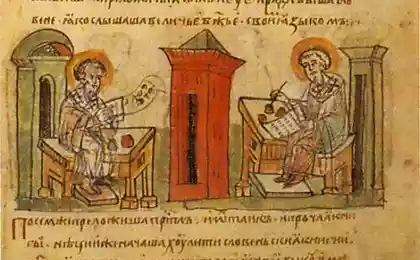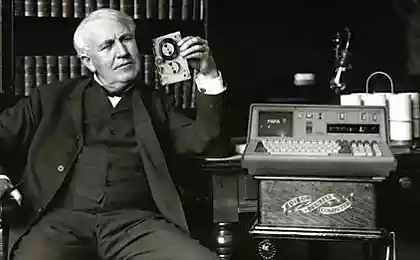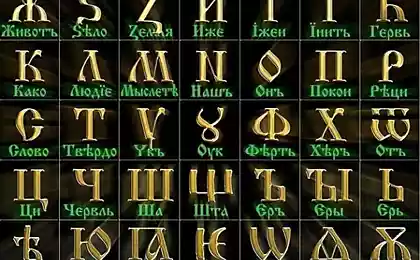7272
Message in Morse
Russian alphabet - absolutely unique among all known methods of alphabetic writing. The ABC is different from other alphabets, not only practically perfect embodiment of the principle of the uniqueness of the graphical display of "one sound - one letter».
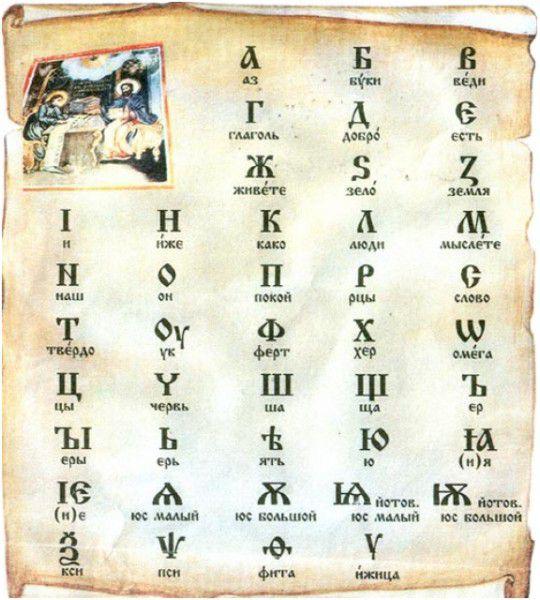
In the alphabet there is the content, I would even say, the whole message of the immemorial (pardon the pathos) that we, if we try a little, we can read literally.
To begin, let us recall the familiar childhood phrase "Every hunter wants to know where sits the pheasant" - an excellent algorithm for storing a sequence of colors of the rainbow (red, orange, yellow, green, blue, indigo, violet).
It - t. N. akrofonichesky way: each word phrase starts with the same letter as the name of the color (Acrophony - the formation of words from the initial letters of the original phrase. The words are read not by alphabetical name of the letter, but as a common word).
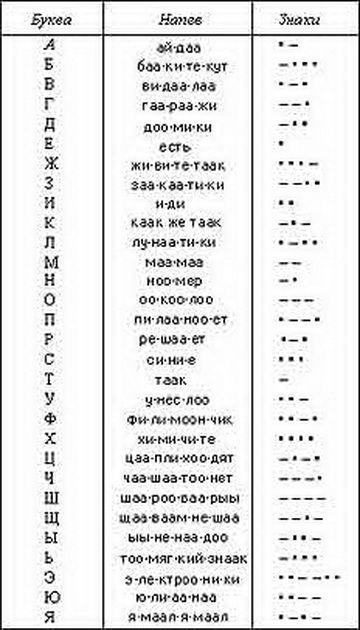
However akrofonicheskoe memorization - not "toys". For example, after the invention of Morse in 1838 the famous code for telegraphic communications problem of mass education telegraph. Quickly memorize Morse code was harder than the multiplication table. The solution was found: for the convenience of storing each character Morse countered word beginning with the letter, which passes this sign. For example, "point-dash" steel "watermelon" as passed "a." In short, Acrophony provides convenient memorizing the alphabet and, as a consequence, the most rapid dissemination.
Among the three major European alphabets in one way or another have akrofonichnostyu: Greek, Hebrew and Cyrillic (Glagolitic). In the Latin alphabet, this feature is completely absent, so Latin could appear only on the basis of already prevalent writing, when there is no need Acrophony.
Posted in [mergetime] 1414489049 [/ mergetime]
Greek alphabet
In the Greek alphabet traced the remains of this phenomenon in the names of 14 of the 27 letters: alpha, beta (correct - Vita), gamma, and so on. D. However, these words mean nothing in the Greek language and are slightly distorted derivatives of the Hebrew words "Alef" (ox ), "Beth" (house), "gimel" (camel) and t. n. Hebrew fully preserves Acrophony still that way, many immigrants promotes rapid learning in Israel. By the way, on the basis of a comparison akrofonichnosti points directly to a specific borrowing Greek Hebrew letters.
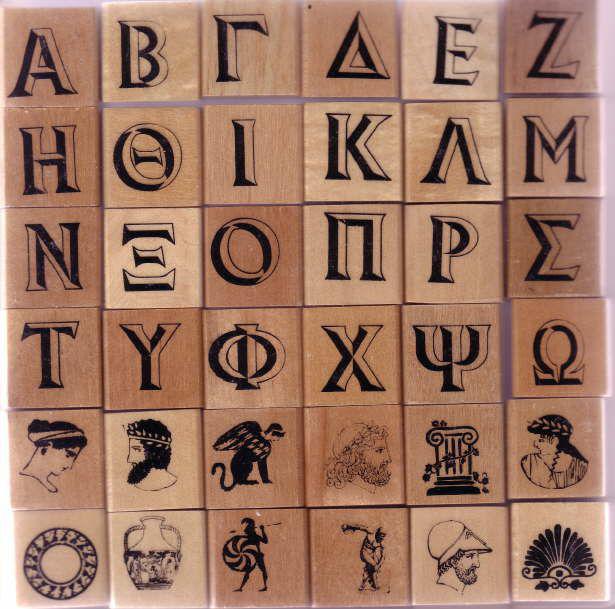
Hebrew text
Proto-Slavic alphabet also has a sign akrofonichnosti completely, but significantly different from the Hebrew, writes in his book "The Alphabet: message to the Slavs" Russian chemist, musician and author of works on the history of linguistics and Yaroslav Kesler. The Jews all the names of the letters - nouns in singular and nominative. But among the 29 letters of the names of the Slavic alphabet - at least 7 verbs. 4 of them - in the imperative mood: two in the singular (Rtsy, particle) and two - in the plural (thoughts, live), a verb in the infinitive form (ive) - one in the third person singular (is) and one - in the past tense (lead). Moreover, among the names of the letters are found and pronouns (kako, shta), and adverbs (solid, exceedingly), and the names of plural nouns (people, beeches). In normal conversation, one connected verb has an average of three other parts of speech. The names of the letters of the alphabet Slavonic there is a sequence such that points directly to the coherent nature of the elementary items.
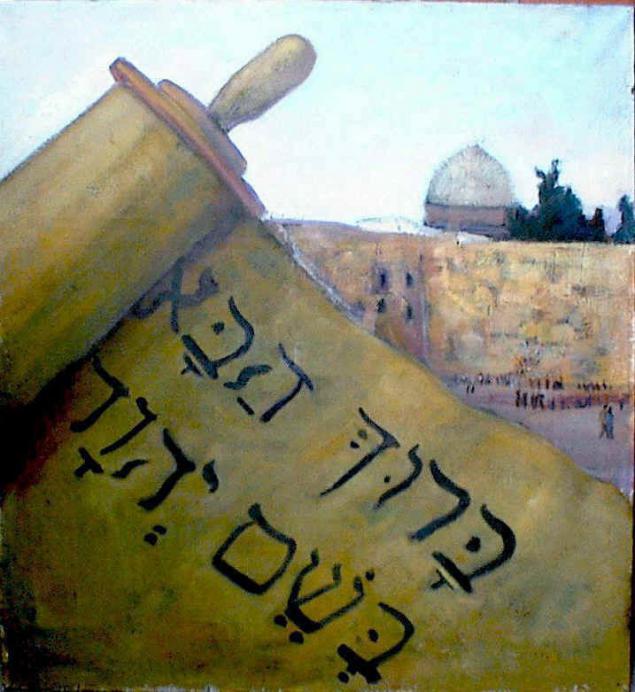
Thus, the pre-Slavic alphabet is a Message - set encoding of phrases which allow each sound of the language system to give an unambiguous graphical line (t. E. The letter).
And now - WARNING! Consider the first three letters of the alphabet - Az, beeches, lead. Az - "I". Buki (buky) - "letters, letter." Vedi (Veda) - "know", the perfect past tense of "vediti" - to know who was in charge.
Combining akrofonicheskie names of the first three letters of the alphabet, we obtain the following:
"Az Buki Veda" - "I know the letters."
Are combined into phrases and all subsequent letters of the alphabet:
Glagol - "word", and not only spoken but written.
Welcome - "property, acquired wealth».
There (is natural) - third person singular of the verb "to be".
We read: "Welcome glagol the natural" - "word - a treasure."
Live - the imperative mood, the plural of "live" - "to live in labor, and not to vegetate."
Zelo - "hard, with zeal" (Wed. Eng. Zeal - persistent, zealous, jealous - jealous, and biblical name Zealot - "jealous"). Land - "Planet Earth and its inhabitants, earthlings."
And - the word "and."
Ilk - "those who are the same."
Kako - "like", "like".
People - "being reasonable."
We read: "Live exceedingly, land, and others kako people" - "live, work harder, humans, and as befits a people." Thought - the imperative, the plural of "think, comprehend the mind."
Nash - "our" in the usual sense.
On - "aforesaid" in the sense of "the only one."
Rest (rest) - "base (the universe)." Avg. "Rest" - "based on anything."
We read: "Thoughts on nash chambers" - "comprehend our universe."
Rtsy (RCI) - the imperative: "Say, utters, read aloud."
Avg. "Speech." Word - "impart knowledge."
Solid - "certainty and conviction."
We read: "Rtsy word firmly" - "Carry knowledge with conviction."
Uk - the basis of knowledge, doctrine. Avg. science, learning, skill practice.
Fert, f (b) ret - "fertilizes".
Her - "divine, this again" (Wed. him. Herr - lord, God, Greek. "Iero" - divine, Eng. Hero - a hero, and the Russian name of God - Horse).
We read: "uk fret Her" - "knowledge fertilizes the Almighty," "knowledge - the gift of God."
Qi (chi, CTI) - "tochi, penetrate, penetrate, be of good cheer."
Worms (worms) - "one who sharpens penetrates."
W (t) and (W, G) - the "what" in the sense of "to."
B, b (er / Eph, r) is a version of one letter, means an unspecified short vowel, close to the "e".
Option "b" later emerged from the "i" (that's writing is displayed until the XX century. Letter "yat").
Yus (JUS small) - "light" Old Russian "jar". In modern Russian root "jar" is preserved, such as in the word "clear".
YAT (Yati) - "to comprehend, to have."
"Tzu, worms, shta ra yus Yati!»
Stands for "Dare, tochi worm to comprehend the light of Jehovah!».
The totality of the above phrases and makes Alphabetical Message:
"Az Buki Veda. Glagol the natural goodness.
Live Zelo, the earth, and his ilk kako people,
minded nash on chambers.
Rtsy word firmly - uk Her fret.
Tzu, worms, shta ra yus Yati! »
And if you give this message modern sound, you get something like this:
I know the letters. Letter - a treasure.
Work harder, earthlings,
As befits sensible people.
Comprehend the universe!
Wear the word with conviction: Knowledge - the gift of God!
Dare, to penetrate, to comprehend the light of Jehovah!
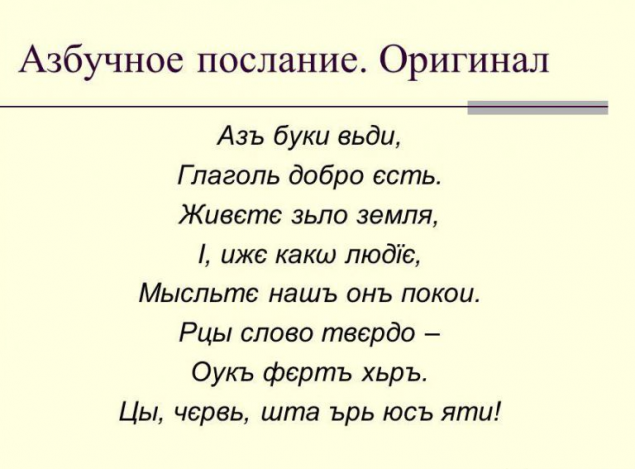
10)
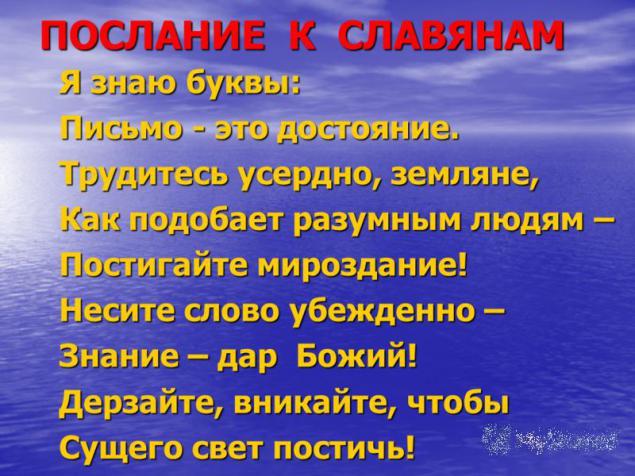

In the alphabet there is the content, I would even say, the whole message of the immemorial (pardon the pathos) that we, if we try a little, we can read literally.
To begin, let us recall the familiar childhood phrase "Every hunter wants to know where sits the pheasant" - an excellent algorithm for storing a sequence of colors of the rainbow (red, orange, yellow, green, blue, indigo, violet).
It - t. N. akrofonichesky way: each word phrase starts with the same letter as the name of the color (Acrophony - the formation of words from the initial letters of the original phrase. The words are read not by alphabetical name of the letter, but as a common word).

However akrofonicheskoe memorization - not "toys". For example, after the invention of Morse in 1838 the famous code for telegraphic communications problem of mass education telegraph. Quickly memorize Morse code was harder than the multiplication table. The solution was found: for the convenience of storing each character Morse countered word beginning with the letter, which passes this sign. For example, "point-dash" steel "watermelon" as passed "a." In short, Acrophony provides convenient memorizing the alphabet and, as a consequence, the most rapid dissemination.
Among the three major European alphabets in one way or another have akrofonichnostyu: Greek, Hebrew and Cyrillic (Glagolitic). In the Latin alphabet, this feature is completely absent, so Latin could appear only on the basis of already prevalent writing, when there is no need Acrophony.
Posted in [mergetime] 1414489049 [/ mergetime]
Greek alphabet
In the Greek alphabet traced the remains of this phenomenon in the names of 14 of the 27 letters: alpha, beta (correct - Vita), gamma, and so on. D. However, these words mean nothing in the Greek language and are slightly distorted derivatives of the Hebrew words "Alef" (ox ), "Beth" (house), "gimel" (camel) and t. n. Hebrew fully preserves Acrophony still that way, many immigrants promotes rapid learning in Israel. By the way, on the basis of a comparison akrofonichnosti points directly to a specific borrowing Greek Hebrew letters.

Hebrew text
Proto-Slavic alphabet also has a sign akrofonichnosti completely, but significantly different from the Hebrew, writes in his book "The Alphabet: message to the Slavs" Russian chemist, musician and author of works on the history of linguistics and Yaroslav Kesler. The Jews all the names of the letters - nouns in singular and nominative. But among the 29 letters of the names of the Slavic alphabet - at least 7 verbs. 4 of them - in the imperative mood: two in the singular (Rtsy, particle) and two - in the plural (thoughts, live), a verb in the infinitive form (ive) - one in the third person singular (is) and one - in the past tense (lead). Moreover, among the names of the letters are found and pronouns (kako, shta), and adverbs (solid, exceedingly), and the names of plural nouns (people, beeches). In normal conversation, one connected verb has an average of three other parts of speech. The names of the letters of the alphabet Slavonic there is a sequence such that points directly to the coherent nature of the elementary items.

Thus, the pre-Slavic alphabet is a Message - set encoding of phrases which allow each sound of the language system to give an unambiguous graphical line (t. E. The letter).
And now - WARNING! Consider the first three letters of the alphabet - Az, beeches, lead. Az - "I". Buki (buky) - "letters, letter." Vedi (Veda) - "know", the perfect past tense of "vediti" - to know who was in charge.
Combining akrofonicheskie names of the first three letters of the alphabet, we obtain the following:
"Az Buki Veda" - "I know the letters."
Are combined into phrases and all subsequent letters of the alphabet:
Glagol - "word", and not only spoken but written.
Welcome - "property, acquired wealth».
There (is natural) - third person singular of the verb "to be".
We read: "Welcome glagol the natural" - "word - a treasure."
Live - the imperative mood, the plural of "live" - "to live in labor, and not to vegetate."
Zelo - "hard, with zeal" (Wed. Eng. Zeal - persistent, zealous, jealous - jealous, and biblical name Zealot - "jealous"). Land - "Planet Earth and its inhabitants, earthlings."
And - the word "and."
Ilk - "those who are the same."
Kako - "like", "like".
People - "being reasonable."
We read: "Live exceedingly, land, and others kako people" - "live, work harder, humans, and as befits a people." Thought - the imperative, the plural of "think, comprehend the mind."
Nash - "our" in the usual sense.
On - "aforesaid" in the sense of "the only one."
Rest (rest) - "base (the universe)." Avg. "Rest" - "based on anything."
We read: "Thoughts on nash chambers" - "comprehend our universe."
Rtsy (RCI) - the imperative: "Say, utters, read aloud."
Avg. "Speech." Word - "impart knowledge."
Solid - "certainty and conviction."
We read: "Rtsy word firmly" - "Carry knowledge with conviction."
Uk - the basis of knowledge, doctrine. Avg. science, learning, skill practice.
Fert, f (b) ret - "fertilizes".
Her - "divine, this again" (Wed. him. Herr - lord, God, Greek. "Iero" - divine, Eng. Hero - a hero, and the Russian name of God - Horse).
We read: "uk fret Her" - "knowledge fertilizes the Almighty," "knowledge - the gift of God."
Qi (chi, CTI) - "tochi, penetrate, penetrate, be of good cheer."
Worms (worms) - "one who sharpens penetrates."
W (t) and (W, G) - the "what" in the sense of "to."
B, b (er / Eph, r) is a version of one letter, means an unspecified short vowel, close to the "e".
Option "b" later emerged from the "i" (that's writing is displayed until the XX century. Letter "yat").
Yus (JUS small) - "light" Old Russian "jar". In modern Russian root "jar" is preserved, such as in the word "clear".
YAT (Yati) - "to comprehend, to have."
"Tzu, worms, shta ra yus Yati!»
Stands for "Dare, tochi worm to comprehend the light of Jehovah!».
The totality of the above phrases and makes Alphabetical Message:
"Az Buki Veda. Glagol the natural goodness.
Live Zelo, the earth, and his ilk kako people,
minded nash on chambers.
Rtsy word firmly - uk Her fret.
Tzu, worms, shta ra yus Yati! »
And if you give this message modern sound, you get something like this:
I know the letters. Letter - a treasure.
Work harder, earthlings,
As befits sensible people.
Comprehend the universe!
Wear the word with conviction: Knowledge - the gift of God!
Dare, to penetrate, to comprehend the light of Jehovah!

10)







